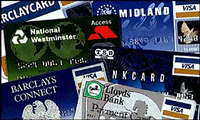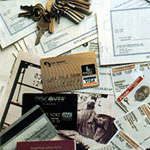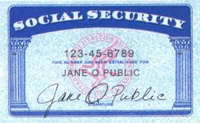AEGIS
PROTECTIVE
SERVICES
IDENTITY
THEFT

IDENTITY THEFT SURVIVAL GUIDE
THE OVERVIEW
It's
on the rise, and it could happen to you.
 The Feds have charged three men with
selling tens of thousands of people's personal and
credit information. They sold each identity for roughly
$60 to crooks who then exhausted the victims' bank
accounts, spent credit cards to their limits and used
their Social Security numbers.
The Feds have charged three men with
selling tens of thousands of people's personal and
credit information. They sold each identity for roughly
$60 to crooks who then exhausted the victims' bank
accounts, spent credit cards to their limits and used
their Social Security numbers.
The scale of this crime may be unprecedented, but the problem is nothing new. Identity theft was the fastest growing crime in the U.S. last year, according to the Federal Trade Commission. Some experts estimate that as many as 1.1 million people were victimized last year.
"Identity theft is a huge problem, and every number and indicator shows that it's on the rise," said Edmund Mierzwinski, a consumer advocate at the U.S. Public Interest Research Group. "This is not a question of six degrees of separation -- everybody knows somebody who's been a victim."
Identity theft 101
With just your name, Social Security number and birth date, identity thieves are often limited only by their creativity. They can go on a shopping spree using credit cards in your name, take out large sums of money at the bank, and apply for health insurance, cell phone service or even a new job as your financially irresponsible clone. And it can take years to set the record straight.
In addition to pressing charges, attorney Mari Frank -- an identity theft survivor and author of the Identity Theft Survival Kit -- faced the formidable task of cleaning up her destroyed credit. She spent over 500 hours on the phone and wrote 90 certified letters to credit reporting agencies, communicating with credit grantors, crime investigators, banks, insurance companies and even the State Bar of California.
"It took tremendous effort to overcome these obstacles, and assert my legal and financial rights," Frank said.
Stealing your good name
 Identity thieves once rifled through the trash (a
practice known in criminal circles as "dumpster diving")
to look for discarded credit offers, bank statements
and other useful documents, but these days they're
more likely to cut to the chase and just steal your
mail, according to Linda Foley, executive director
of the
Identity
Theft Resource Center.
Identity thieves once rifled through the trash (a
practice known in criminal circles as "dumpster diving")
to look for discarded credit offers, bank statements
and other useful documents, but these days they're
more likely to cut to the chase and just steal your
mail, according to Linda Foley, executive director
of the
Identity
Theft Resource Center.
There can also be some acting involved. Thieves can call one of the three main credit bureaus and pretend to be a prospective landlord, employer or lender, asking for your credit information; or they can even call you, representing a company that doesn't exist, in an attempt to squeeze out your name, Social Security number and other goodies, said Brad Dakake, a consumer advocate at the Massachusetts Public Interest Research Group.
Computer-savvy thieves can even get your information from the Internet. And an alarming number of swindlers now get their data from insiders, or are insiders -- at your office, the doctor's office, credit bureaus and health insurance carriers, and so on. These people are willing to sell your name and information or use it themselves, said Frank.
An
ounce of prevention: You can't control
what other people do with your information,
but you can take a few preemptive measures
of your own. Here are the guidelines:

- Keep your Social
Security number to yourself.
Don't give it to folks who don't need it, and know that many people who don't need it will ask for it. If you have a driver's license, never opt to use your Social Security number as your license number as well. - Remember to shred.
Enron and Andersen may have recently revealed the darker side of document shredding. But if you're tossing old tax returns, bank statements, or other documents that contain the information hungry identity thieves crave, shredding is the only way to go. A crosscut paper shredder works best, according to the Identity Theft Resource Center. - Get your credit
report at least once a year.
Call the three main credit bureaus, Equifax (1-800-685-1111), Experian (1-888-397-3742) and Transunion (1-800-888-4213) and ask that they mail you a copy of your credit report. Make sure there are no surprises, and that you can account for all the activity on that report. - Opt out.
Thieves use mailed pre-approved credit offers and the "convenience checks" that often accompany them to get a credit card quickly. According to the postmaster general, 30 percent of convenience checks get used fraudulently. If you want fewer pre-approved credit offers in your mailbox, you can call (800) 5-OPT-OUT and ask them to remove your name and address from the mailing lists. - Tell your bank,
health insurer, and others not to share.
Call the companies and services you deal with regularly and tell them not to share your information with their affiliates. - Use common sense!
Don't have conversations about your bank account or credit in public. Deposit mail in a locked mailbox, ideally inside the post office itself. Pay attention to your billing cycles, use complicated ATM passwords, memorize your Social Security number (so you don't have to show the card in public) and be cautious about who has access to information in your home.
Getting your identity back
 Dealing with identity theft poses
immense frustrations. Many consumer advocates blame
the credit industry for issuing credit with so few
restrictions. Creditors often write off a large portion
of the losses, or make up for them by charging hefty
fees, leaving consumers, merchants and law enforcers
to deal with the rest, said Frank.
Dealing with identity theft poses
immense frustrations. Many consumer advocates blame
the credit industry for issuing credit with so few
restrictions. Creditors often write off a large portion
of the losses, or make up for them by charging hefty
fees, leaving consumers, merchants and law enforcers
to deal with the rest, said Frank.
"When you're a victim of identity theft, you're not liable for the money, but you are responsible for getting rid of the accounts and restoring your credit," Merzwinski said. "That means you have to deal with the credit industry, and they often refuse to take your calls. They'd be happy to leave you on hold until the next Final Four [NCAA basketball tournament]."
If you do fall victim, there are a few things you must do: first, of course, ask that any fraudulent accounts be closed. Contact the fraud departments of the three major credit bureaus (see telephone numbers above) and have a fraud alert placed on your account. The alert requires that no new credit be granted without your approval.
File a report with the police, and get a copy, in case the bank, the credit card company or others need proof of the crime later on. Finally, file the Federal Trade Commission's ID Theft Affidavit, which alerts many companies and organizations that may have fraudulent accounts opened in your name.
Unfortunately, there's no quick and
easy solution, and you'll likely spend a lot of time
explaining the situation on the phone. Each victim,
on average, spends 175 hours and about $800 out of
his own pocket to clear his name, said Dakake.
*Article provided by the CNN MONEY Click on the link or banner to be connected to the official website of CNN MONEY

AEGIS
PROTECTIVE
SERVICES
IDENTITY
THEFT

Aegis Services Aegis Training Aegis FAQS Aegis Resources About Aegis